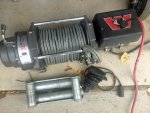Rezarf <><
Explorer
I am installing a Warn M12000 onto an ARB bumper this week and was wondering what kind of weight savings I could expect if I replaced the steel cable with synthetic? I hate to toss out a perfectly good unused 3/8" steel cable however, saving the fuel mileage and weight on the front could save $$$ over the long haul.
Also, from those with experience, what brand length and diameter would you replace it with?
I almost went with an 8274 and custom bumper for since it has so much rope and its so freakin' fast... but I digress.
Since everyone likes a pic

Also, from those with experience, what brand length and diameter would you replace it with?
I almost went with an 8274 and custom bumper for since it has so much rope and its so freakin' fast... but I digress.
Since everyone likes a pic

